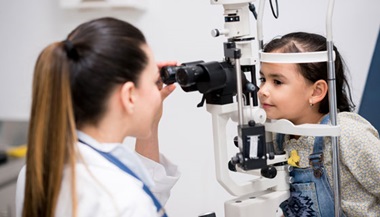JIA-Associated Uveitis
What is JIA-associated uveitis?
Uveitis is an inflammation of the uvea, the layer between the sclera and the retina. Uveitis can occur spontaneously, or it can be caused by infections or autoimmune diseases in which the immune system mistakenly attacks the body’s own tissues and organs — in this case, the uvea. One such disease is juvenile idiopathic arthritis (JIA), a type of autoimmune arthritis in children, hence the term JIA-associated uveitis.
If the inflammation is not treated promptly, scarring and vision problems develop, including glaucoma, cataracts and eventually loss of vision. Uveitis can occur during or after JIA, and even after the disease is under control and there aren’t other symptoms.
Symptoms
Uveitis symptoms may not be obvious symptoms, and tend to develop slowly. Sometimes children say the light bothers them or they have blurred vision. If your child has been diagnosed with JIA, it is very important to see a pediatric ophthalmologist regularly and pay attention to the following signs:
- Red eyes
- Blurred vision
- Sensitivity to light
- Dark floating spots in the vision
A child may also have other symptoms associated with the autoimmune disease, including joint pain, fever, malaise, fatigue and flu-like symptoms.
Diagnosis
A thorough eye exam is usually needed to diagnose uveitis. Blood tests and X-rays can be used to determine whether another underlying disorder, such as JIA, is causing the condition.
Eye exams include:
- Dilated eye exam, during which the retina and optic nerves are examined at a close up for signs of damage using a device called ophthalmoscope
- Tonometry, a test that measures the pressure inside the eye
- Slit-lamp exam of the structures in the front of the eyes
Treatment
- Steroid eye drops to reduce inflammation and swelling for short-term treatment
- Oral steroids
- Medications that suppress the overactive immune system in JIA
In certain cases, a new class of medications called biologic response modifiers that can keep the immune system in balance
When to Call for Help
If your child has any of the above symptoms, seek advice from your pediatrician. If your child has been diagnosed with JIA, it is very important to see a pediatric ophthalmologist regularly.





